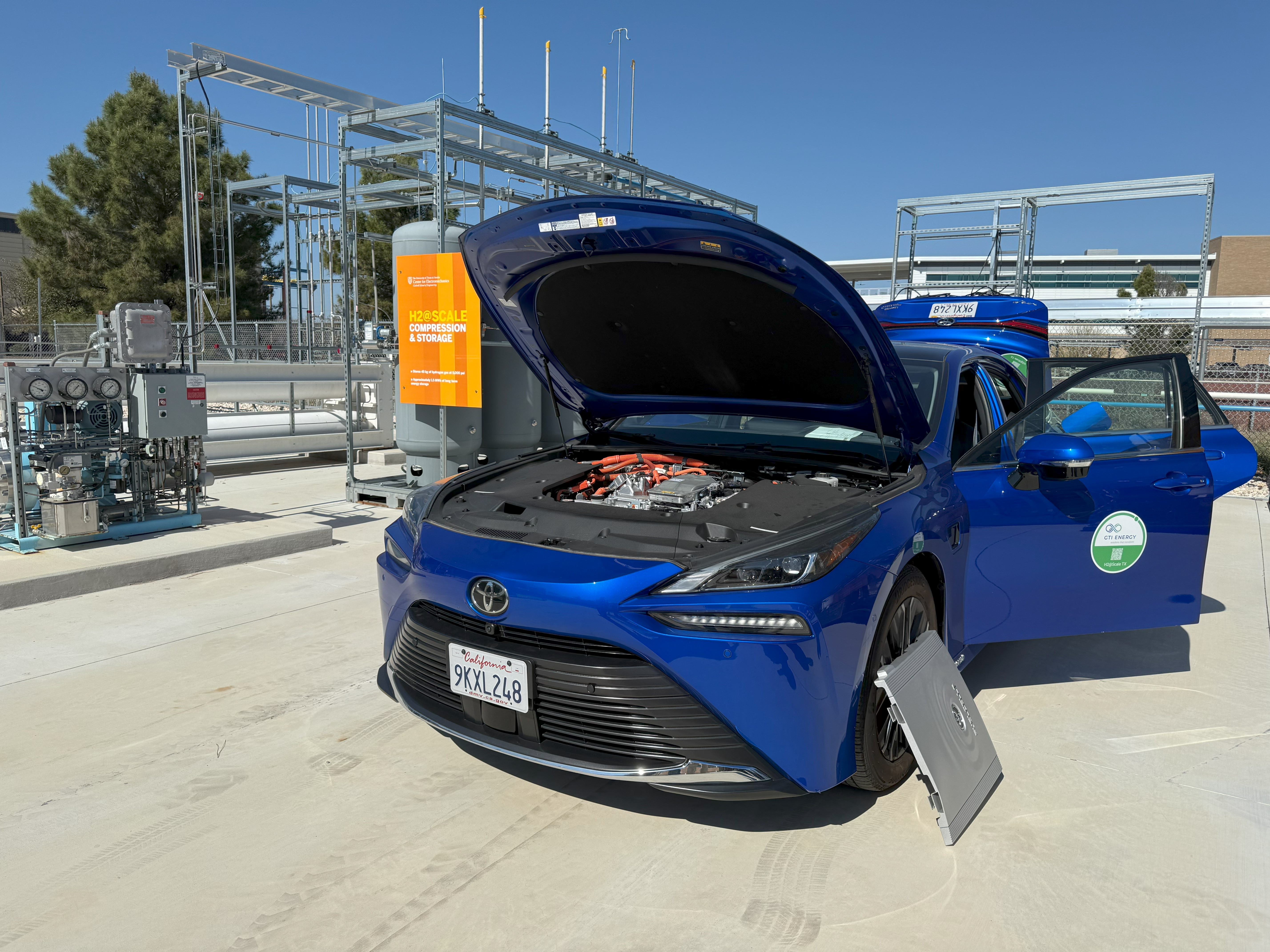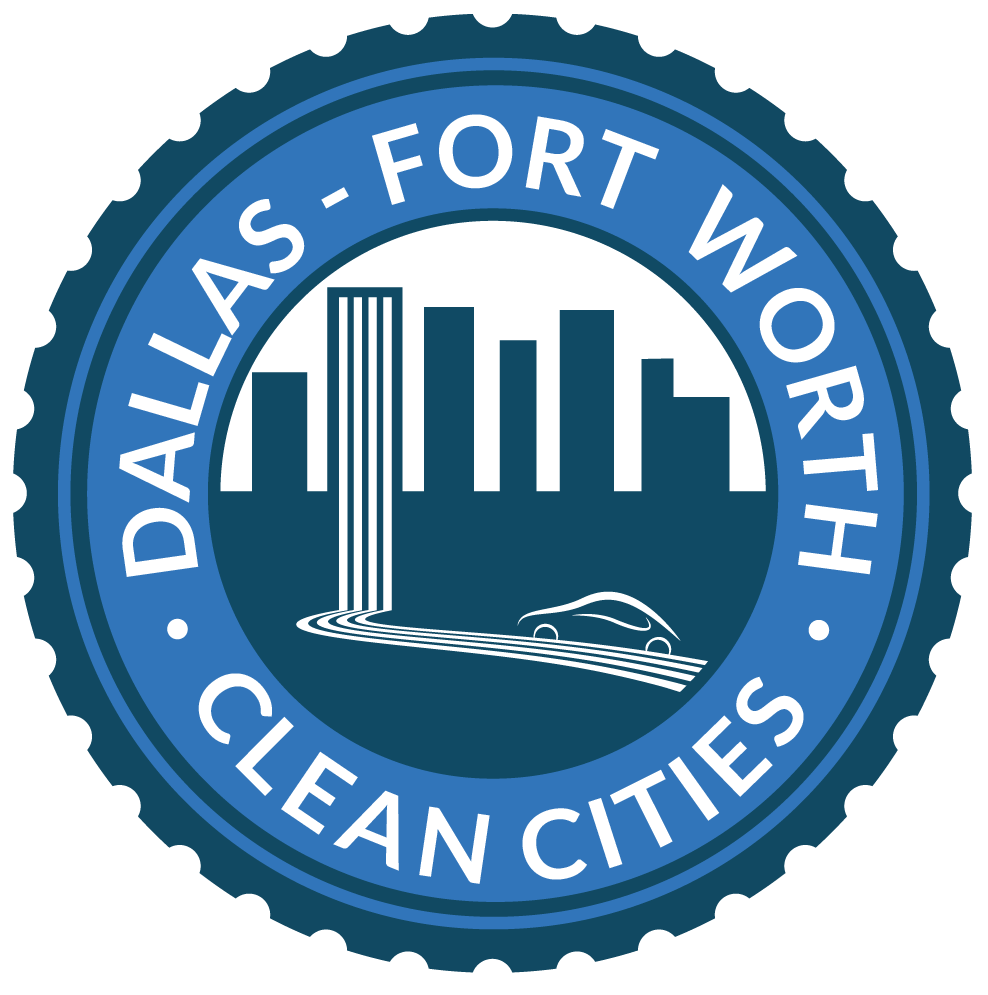Hydrogen is an abundant, domestically produced fuel that can be used in several different applications.
As a fuel type for transportation, hydrogen has multiple applications. Light-duty vehicles are currently most common, but momentum is growing for adoption of hydrogen-powered heavy-duty trucks. Currently, vehicles that can be fueled by hydrogen are fuel cell electric vehicles (FCEV). In FCEVs, hydrogen is compressed and stored in the vehicle. When the vehicle is ready to move, the compressed hydrogen is converted to electricity to propel the vehicle. Learn more about how FCEVs work from this infographic. Heavy-duty hydrogen internal combustion engines are currently in development.
BENEFITS OF HYDROGEN
Benefits to using hydrogen as an energy source include  the following.
the following.
- Fast refueling time
- No tailpipe emissions, the only byproducts are water
vapor and warm air - Increased range compared to battery electric vehicles
- Can be produced domestically
- Can be produced from renewable sources
Read more in the Department of Energy’s Vehicle Technologies
Office publication on the benefits of using hydrogen in the
transportation sector.
For more resources on hydrogen from a broader scale, visit the
Department of Energy’s Hydrogen and Fuel Cell Technologies Office
website.
HYDROGEN IN TEXAS
Texas already boasts a substantial workforce well versed in hydrogen technology, as the Texas Gulf Coast is the source of approximately one-third of the entire nation’s hydrogen supply. In Texas, the transition to hydrogen vehicle technology is focused on the trucking industry. This transition is important in North Texas because heavy-duty diesel trucks are the biggest contributor to the region’s ozone nonattainment problems, causing 78% of all ozone-forming NOx emissions in the ozone nonattainment area, even though they only travel 11% of the miles. Switching to hydrogen-fueled trucks can reduce this air pollution. In addition, the Texas Gulf Coast is the source of approximately one-third of the entire nation’s hydrogen supply. This means that North Texas can access hydrogen fuel at a much lower cost than most of the country as the supply is readily available. DFW Clean Cities is helping move toward adoption of hydrogen vehicles by leading or participating in the following activities.
Texas Hydrogen and Electric Freight Truck Infrastructure Project (Tx-HEFTI)
NCTCOG has been awarded $70 million through the Corridor Program of the Federal Highway Administration’s Charging and Fueling Infrastructure Discretionary Grant Program to construct up to 5 medium-/heavy- duty hydrogen refueling stations along the Texas Triangle. The Tx-HEFTI project was informed by NCTCOG’s Interstate 45 Zero-Emission Vehicle Infrastructure Deployment Plan.
North Central Texas Hydrogen User Forum
NCTCOG and DFW Clean Cities, in partnership with The University of Texas at Arlington and the Texas Hydrogen Alliance, hosted a Hydrogen User Forum in 2024, to allow industry members to hear from their peers about the current and future state of hydrogen.
Interstate (IH) 45 Zero-Emission Vehicle (ZEV) Infrastructure Deployment Plan
Funded by an applied research funding opportunity from Federal Highway Administration, NCTCOG in collaboration with H-GAC and stakeholders developed an Interstate Highway (IH) 45 Zero-Emission Vehicle (ZEV) Corridor Plan to facilitate the use of ZEV Heavy-Duty Battery Electric Vehicle and H2 trucks from Dallas to Houston.
Zero-Emission Vehicle Workshop
NCTCOG and DFW Clean Cities, in partnership with the Environmental Defense Fund (EDF), hosted a Zero Emission Vehicle Workshop for over 100 fleet managers, local governments, IH-45 stakeholders, and industry experts.
Texas Hydrogen Alliance
The Texas Hydrogen Alliance (THA) was created in fall 2021 as a nonprofit 501(c) organization focused on providing education and public policy advocacy to expedite the adoption of hydrogen technology. Texas Hydrogen Alliance is a working group of industry professionals and stakeholders in the production, implementation, and consumption of hydrogen in the State of Texas.
Alternative Fuel Corridor Designations
TxDOT and NCTCOG have participated in almost every nomination cycle under the FHWA Alternative Fuels Corridor Program. Due to the extensive industry involvement in the IH 45 ZEV Plan, NCTCOG received numerous inquiries from stakeholders asking how to get involved in nominating additional highways for hydrogen designation. Three pending hydrogen corridors were selected in Texas, as announced in October 2023.
Gulf Coast Hydrogen Hub
HyVelocity was selected to be awarded up to $1.2 billion from the Department of Energy H2Hubs program to help kickstart the clean hydrogen economy in Texas and Southwest Louisiana. DFW Clean Cities/NCTCOG is participating in collaborative efforts to support the HyVelocity Hub. The Gulf Coast Hydrogen Hub is additionally included in the Regional Clean Hydrogen Hubs Program (H2Hubs). In October 2023, the Department of Energy (DOE) Office of Clean Energy Demonstrations (OCED), in collaboration with the Office of Energy Efficiency and Renewable Energy’s (EERE) Hydrogen and Fuel Cell Technologies Office (HFTO), announced the seven awarded regional clean hydrogen hubs. The purpose of the H2Hubs is to kickstart a national network of hydrogen producers, consumers, and infrastructure by accelerating the commercial-scale deployment of clean hydrogen.
Texas Emissions Reduction Plan (TERP)
TERP is a Texas Commission on Environmental Quality program that offers grants for people and businesses to purchase or upgrade their vehicles/equipment to newer, cleaner technology. TERP has multiple programs that allow funding for hydrogen vehicles and infrastructure, including the Texas Hydrogen Infrastructure, Vehicle, and Equipment Grant Program (THIVE). THIVE was created by the 88th Texas Legislature, to fund the replacement or repower of on-road heavy-duty motor vehicles or non-road heavy-duty equipment with hydrogen-powered models, or the purchase of those models. The program will also fund the installation of hydrogen refueling infrastructure.
HYDROGEN AT THE FEDERAL LEVEL
National Zero-Emission Freight Corridor Strategy
In March of 2024, the Joint Office of Energy and Transportation and U.S. Department of Energy, in collaboration with the Department of Transportation and the Environmental Protection Agency, released the National Zero-Emission Freight Corridor Strategy. The purpose of this strategy is to guide investments in zero-emission medium- and heavy-duty vehicles and infrastructure, including hydrogen refueling. The Texas Triangle and several corridors in North Texas are identified as key hubs in phase 1 of the strategy.
U.S. National Clean Hydrogen Strategy and Roadmap
In June of 2023, the U.S. Department of Energy Hydrogen Program released the U.S. National Clean Hydrogen Strategy and Roadmap to lay out a strategic framework for achieving large-scale hydrogen production.
FIND A HYDROGEN REFULEING STATION
RESOURCES
General Information
- Hydrogen Production and Distribution (Alternative Fuels Data Center)
- Hydrogen Research and Development (Alternative Fuels Data Center)
- Hydrogen Storage (The Department of Energy Hydrogen Program)
- Hydrogen Fueling Infrastructure in California (California Air Resources Board)
- Road Map to a US Hydrogen Economy (Fuel Cell & Hydrogen Energy Association)
- Roadmap to Fuel Cell Electric Truck Commercialization: California Market Assessment (CALSTART)
- Hydrogen Fuel Cell Partnership (Hydrogen Fuel Cell Partnership)
Laws and Incentives
- Hydrogen Laws and Incentives in Texas (Alternative Fuels Data Center)
- Federal Hydrogen Laws and Incentives (Alternative Fuels Data Center)
Locate Hydrogen Infrastructure
- Hydrogen Refueling Stations in California (California Energy Commission)
- Find a Hydrogen Fueling Station (Alternative Fuels Data Center)
- Find a Hydrogen Fueling Corridor (Alternative Fuels Data Center)
Hydrogen Safety
- Hydrogen and Fuel Cell Safety (Fuel Cell & Hydrogen Energy Association)
- Hydrogen Safety (The Department of Energy Hydrogen Program)
- Toyota Zero-Emission Fuel Cell Electric Heavy-Duty Truck Emergency Response Guide (Toyota)
